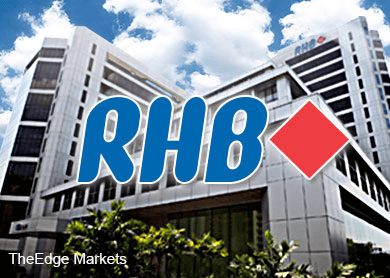

RHB Capital Bhd’s proposed internal restructuring exercise, which will see its banking unit RHB Bank Bhd taking over its listing status, has raised concerns over dilution of earnings per share (EPS) — and some expect the impact to be rather large.
The proposal, which aims to eliminate the holding company structure, involves a cash call to raise up to RM2.5 billion. The banking group’s EPS is expected to see a dilutive effect of 10% to 30% after the rights issue.
The announcement last week, which confirms The Edge’s article dated April 6 titled “RHB Bank may take over parent’s listing status”, did not reveal details such as the ratio for the rights issue and price.
Judging by the share price of RHB Cap (fundamental: 1.5; valuation: 2.1), the proposal has not gone down well with investors. The stock has been heading lower since the news, falling from RM8.20 to RM7.84 last Friday.
Affin Hwang Investment Bank Research, which has a “hold” call on the stock and a RM7.70 target price, says shareholders will be worse off by 15 sen per share from a revalued net asset value (RNAV) perspective after transitioning from an RHB Cap shareholder to an RHB Bank shareholder, based on an indicative RHB Bank RNAV of RM8.05.
“Should the reorganisation exercise fall through, we understand that the proceeds from the rights issue will still be utilised to repay the bank borrowings at RHB Cap’s and the subsidiaries’ level,” it notes.
Some believe the EPS dilution will pay off later in terms of profit enhancement.
The reorganisation will also improve the group’s Common Equity Tier 1 ratio to at least 11% from the current 9%.
Credit Suisse says in an April 3 research note that as RHB Bank Group will have a reduced shareholder fund base due to the goodwill write-off and enhanced net profit, the newly-listed entity can operate on better ROEs (returns on equity) — estimated at 12.1% to 14.3% against 10.8% to 12.2% under its current holding company structure.
Credit Suisse estimates a full year RM120 million per annum enhancement arising from interest savings and tax efficiency gains.
“The rights issue will cause near term EPS and ROE dilution but the dilutive impact will taper off in the coming years, especially if the DRP (dividend reinvestment plan) and dividend payout are reviewed,” it says.
“While the group is not scrapping its DRP, management alluded to the possibility of scaling back the share entitlement under the DRP and stepping up dividend payments,” says Credit Suisse, which has an “outperform” call on the stock with a target price of RM10.40.
For the conversion, Credit Suisse anticipates the ratio to be one RHB Cap share for 1.29 RHB Bank share, with a total value of RM10.80.
Hong Leong Investment Bank (HLIB) concurs that despite the EPS dilution, the proposed corporate exercise will enhance profitability and ROE, on top of addressing the capital issue and inefficiency of the group structure. “The new RHB Bank entity could garner a higher valuation and benefit shareholders.”
HLIB has a “buy” call on the stock with a target price of RM9.19.
A foreign bank-backed dealer points out that while ROE is a better indicator of a bank’s valuations, share price performance is also dependent on how well the group’s management is able to execute its plans.
“There are also macro headwinds for the banking industry. Additionally, there are top management changes at the moment, so there is an uncertainty factor,” he notes.
RHB Cap group managing director Kellee Kam’s resignation takes effect on May 4. The Edge Financial Daily said in February that RHB Cap’s deputy group managing director, Datuk Khairussaleh Ramli, is one of the shortlisted names to succeed Kam.
Additionally, Ong Ju Yan, head of RHB Investment Bank’s group corporate and investment banking services, resigned a few months ago to join his family’s business. Ong is the eldest son of Tan Sri Ong Leong Huat, a major shareholder in RHB and founder of OSK group.
The dealer adds that one of the reasons RHB Cap’s share price has been fairly stagnant and cannot move much is because of the lack of liquidity in its shares.
“There are a number of banking analysts out there arguing that the stock is cheap but the price does not reflect its true value because the free float is small. After this proposed corporate exercise, the shareholding will remain the same with the EPF (Employees Provident Fund) holding a big chunk of it. So, unless the free float increases or the EPF sells down, I don’t expect the stock price to move that much,” he says.
According to Bloomberg data, the estimated free float is about 19%. The EPF has a 41.3% stake in RHB Cap while Aabar Investments has 21.4% and OSK Holdings Bhd 9.9%.
Furthermore, the current harsh operating environment has also deterred interest in banking stocks.
AllianceDBS Research views the proposed exercise positively. It notes that management has hinted the rights issue will be at a 20% to 30% discount to RHB Cap’s share price. But it says the domestic banking sector remains challenging this year with moderating loan growth. “The NIM (net interest margin) is being pressured by higher funding costs, slower capital markets, and higher credit and operating costs due to GST (Goods and Services Tax),” it adds.
Note: The Edge Research’s fundamental score reflects a company’s profitability and balance sheet strength, calculated based on historical numbers. The valuation score determines if a stock is attractively valued or not, also based on historical numbers. A score of 3 suggests strong fundamentals and attractive valuations. Visit www.theedgemarkets.com for more details on a company’s financial dashboard.
This article first appeared in The Edge Malaysia Weekly, on April 20 - 26, 2015.
Save by subscribing to us for your print and/or digital copy.
P/S: The Edge is also available on Apple's AppStore and Androids' Google Play.